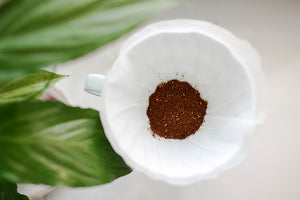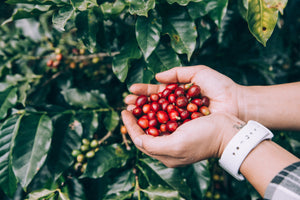
Bean review: Drop Coffee
In his latest installment, Phil Wain reviews four coffees from Sweden's renowned Drop Coffee.
Drop Coffee was founded in Stockholm in 2009 by roasters Joanna Alm and Erik Rosendahl. Their stated focus in on sustainability, quality and traceability. Drop’s coffee has a deserved reputation. Drop don’t roast specific espresso roasts but offer the same single origin roasts for every extraction method. Sourcing is predominantly through Tim Wendleboe’s Nordic Approach importers guaranteeing the very highest quality green beans and a sustainable relationships with growers.
Drop Coffee is now served and available for retail at Flat White in Soho and its sister café Milk Bar. Flat White was at the very forefront of the third wave in London in 2005 and has gone through several transformations since the departure of co-founder Cam McClure. Its prime location and consistent quality have ensured its popularity and a recent renaissance has seen the switch to feature Drop Coffee as both espresso and from a Kalita brew bar (Drop are the Swedish agents for Kalita).
Drop Coffee is available for retail at both cafes at the price of £10 for one of Drop’s beautiful boxes – delightful packaging with extensive notes. Pop down to Soho and enjoy! You never know who you might see – last time I visited, Jimmy Page was sat opposite the bar enjoying a flat white.
The first two of the current Drop coffees I tasted are from Rwanda. Coffee is vital to Rwanda’s post-genocide economy and the country holds a special place in the hearts of many coffee aficionados. Despite the occasional potato defect (no sign here of that bacterial problem), the arrival of the new season’s Rwandan coffees is an exciting time, bringing a great range of tastes and flavours.
Epiphany Muhirwa, Ginkongoro, Rwanda
In Ginkongoro in Southern Rwanda, Epiphany Muhirwa and her son Samuel own the Nyaruziza washing station (commonly known as BUF) which has a long standing partnership with Oslo based Nordic Approach. Hundreds of local farmers bring their high altitude crop here to be washed and processed. This one is dominated by a juicy cranberry acidity with a cocoa hint and a very subtle sweetness. The cranberry lingers beautifully on the tongue after drinking.
Varietal: mixed Bourbon | Process: Washed| Phil's tasting notes: cranberry, cocoa
£10 for 250g from Flat White in Berwick Street
Again from Southern Rwanda, this coffee is the result of a collaboration between Nordic Approach and local producers with the Norwegians as partners and shareholders in the Kamiro washing station in a project known as Motherland Farmers. Around 1000 local farmers are trained. This particular coffee is referred to as HTG (Haute de Gamme) which means it is a combination of the best tasting local lots.
Delicious in the cup, this one reminds me of strawberry cheesecake and lemon candy drops – perhaps strawberry lemonade? It has a beautiful strawberry/lemon/white grape acidity and a slightly wine-like mouthfeel. Despite all my dessert references the sweetness is again a subtle one.
Varietal: mixed Bourbon| Process: Washed | Phil's tasting notes: strawberry lemonade, white wine, lemon drops, strawberry cheesecake
£10 for 250g from Flat White
Next I tasted two coffees from Colombia. Colombia is developing progressive growing and processing techniques and is known for producing a wide range of flavour profiles. Previously, the government encouraged the growth of high yield disease resistant varieties such as Castillo over the quality of varieties such as Caturra but the specialty coffee market is encouraging Colombians to invest in and focus on quality coffee and stories I’ve heard recently include tales of farmers with refractometers out in fields assessing fruit ripeness and a range of experimental processing methods.
Blancas Rojas, Huila, Colombia
Huila is known for complex, fruity coffee. The Bianco Rojas Growers Association established their own cupping lab last year. They are fastidious in keeping lots separated. Nordic Approach pay a premium depending on cupping quality and this co-operative are keen to grow and process to a high standard.
This coffee had an uneven appearance in terms of size and colour of beans and needed some sorting before brewing. It impresses in the tasting however with lots of blackberry, hints of peach candy and white grape acidity.
Varietal: Caturra| Process: Washed | Phil's tasting notes: blackberry, peach candy, white grape
£10 for 250g from Flat White
Located near the Ecuadorian border, this region has extreme altitude which brings its own challenges to coffee production. Farms are small. This micro-lot is a blend of two different lots from the same farmer (Rodrigo Viveros). A local Growers Association pays a premium for quality coffee and works closely with Nordic Approach.
This jammy coffee had notes of orchard fruits, cocoa and berries with lovely tartness reminiscent of cranberries or pomegranate. It has a great juicy finish with beautiful acidity that lingers and prompts memories of wine gums.
Varietal: Caturra and Castillo| Process: Washed | Phil's tasting notes: apple, pear, cocoa, berries, pomegranate, cranberries, wine gums
£10 for 250g from Flat White in Berwick Street
More bean reviews by Phil Wain:



